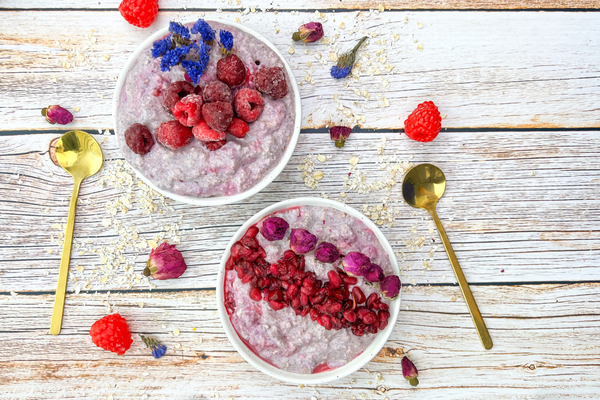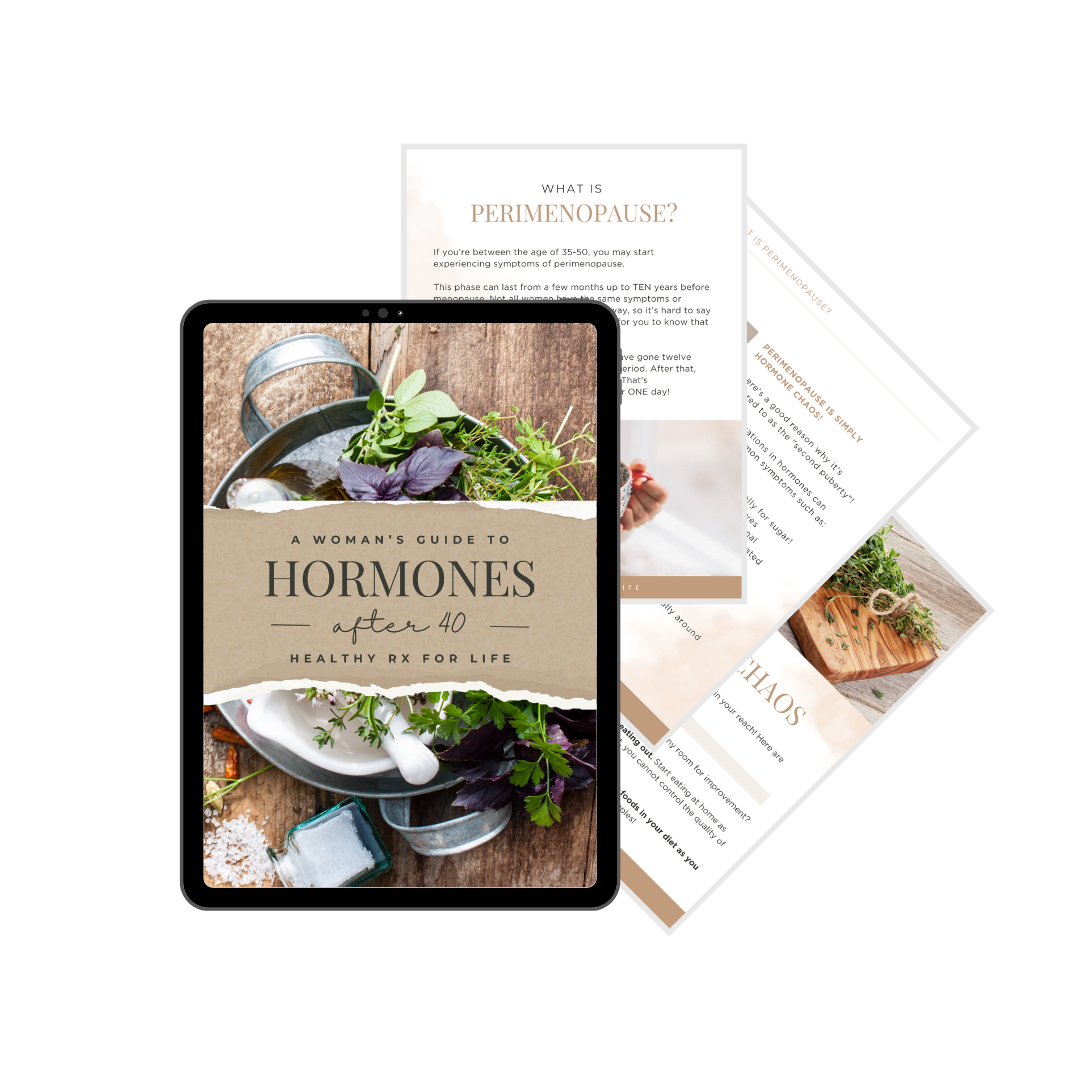Are you a woman in perimenopause juggling work, family, and all the daily to-dos, and suddenly, your body starts sending signals you can’t ignore?
You may be experiencing aching joints, bloating, brain fog, and an emotional rollercoaster that seems to be on overdrive. You chalk it up to stress or age, but what if something deeper is at play?
For many women in perimenopause, these symptoms are a sign of chronic inflammation quietly making things worse. It’s like your body is waving a red flag, signaling that something isn’t quite right beneath the surface.
Let’s dive into the topic of chronic inflammation in perimenopause and, most importantly, what you can do to start feeling better!
What Causes Chronic Inflammation?
Here’s the thing: chronic inflammation isn’t the root cause of your symptoms—it’s a warning sign, a smoke alarm going off. While we can measure inflammation through blood tests, the real question is, why is the inflammation there in the first place? What’s fueling it?
For women in perimenopause, hormone fluctuations often magnify these issues, turning what might have been minor symptoms into significant roadblocks. But with a bit of detective work, it’s possible to uncover the real triggers behind the inflammation and regain control of your health.
Here are some common causes of chronic inflammation in perimenopause:
1. Infections
One of the less obvious contributors to chronic inflammation is a lingering infection. Many types of infections—whether viral, bacterial, fungal, or parasitic—can evade your immune system and persist for years, quietly triggering inflammation. For example, viral infections like Epstein-Barr or certain bacterial infections like Lyme disease can simmer beneath the surface, causing your immune system to stay in constant alert mode. You might not even know you have an infection because the symptoms can be subtle or masked by other health issues.
In perimenopause, these underlying infections can worsen your hormone imbalances, making it harder for your body to regulate inflammation and respond to stressors. If your body is dealing with an old infection, the inflammation it causes can exacerbate symptoms like joint pain, fatigue, and mood swings. Detecting and addressing these infections with the help of a healthcare professional is key to reducing the body’s inflammatory response and lightening the load on your immune system.
2. Toxins
Toxicity is another significant and often overlooked driver of chronic inflammation. In today’s world, we’re constantly exposed to toxins, whether through the food we eat, the air we breathe, or the personal care products we use. Pesticides, chemicals, pollutants, and even mold exposure can all aggravate the immune system, keeping it in a state of irritation and inflammation. For women in perimenopause, this toxic burden can intensify already fluctuating hormone levels, making symptoms like fatigue, bloating, and brain fog even more pronounced.
Even small amounts of toxins over time can accumulate and overwhelm your body’s natural detoxification system. When your liver, kidneys, and gut can’t keep up with the load, toxins stay in circulation and fuel ongoing inflammation. Cleaning up your environment—by eating organic when possible, using non-toxic cleaning products, and filtering your air and water—can be powerful steps toward reducing inflammation and supporting your hormones.
3. Diet
Your diet plays a pivotal role in either promoting or reducing inflammation. Diets high in processed foods, refined sugars, and unhealthy fats are notorious for driving up levels of inflammatory molecules in the body. These foods not only spike your blood sugar, causing energy crashes and mood swings, but they also contribute to systemic inflammation that can worsen perimenopause symptoms.
On the flip side, adopting a diet rich in anti-inflammatory foods—such as leafy greens, fatty fish, nuts, seeds, and plenty of colorful fruits and vegetables—can help bring down inflammation and support hormone health. You don’t need to overhaul your entire diet overnight, but small, consistent changes can make a huge difference!
4. Low Sex Hormones
As estrogen and progesterone levels start to fluctuate in perimenopause, the body’s ability to control inflammation can become impaired. Estrogen, for instance, has anti-inflammatory properties that help regulate immune responses. When estrogen levels drop, inflammation can spike, making you more susceptible to inflammatory diseases and worsening perimenopausal symptoms like joint pain, weight gain, and fatigue.
Supporting your hormones during this time is essential. Working with a healthcare professional to explore options like bioidentical hormone replacement therapy (BHRT) or focusing on lifestyle strategies to naturally balance your hormones can help keep inflammation in check.
5. Poor Gut Health
Your gut plays a central role in regulating inflammation. If your gut health is compromised—whether from poor diet, chronic stress, or imbalances in gut bacteria—it can lead to increased gut permeability, often called “leaky gut.” When the gut lining becomes more permeable, toxins, bacteria, and undigested food particles can pass into your bloodstream, triggering widespread inflammation throughout the body.
For women in perimenopause, gut health becomes even more critical as hormonal changes affect digestion and the gut microbiome. Incorporating gut-friendly foods like fermented vegetables, bone broth, and probiotics can help repair the gut lining and reduce inflammation.
6. Obesity
Carrying excess weight, especially around your abdomen, doesn’t just affect how you feel physically—it also plays a role in inflammation. Visceral fat, the type that surrounds your organs, acts like an endocrine organ by releasing inflammatory compounds into the body. As women approach perimenopause, weight gain often shifts to the midsection, increasing the risk of chronic inflammation and conditions like insulin resistance or metabolic syndrome.
What You Can Do to Reduce Chronic Inflammation in Perimenopause
Now that we’ve covered the potential triggers of chronic inflammation, let’s talk about actionable steps you can take to start reducing it!
1. Prioritize Sleep
Sleep is your body’s time to heal and reset, making it critical for managing inflammation. During perimenopause, sleep can become elusive due to night sweats or anxiety, but improving your sleep hygiene can make a big difference. Aim for 7-9 hours of restful sleep each night. Create a calming bedtime routine, avoid screens before bed, and make your sleep environment as comfortable as possible.
2. Manage Stress
Chronic stress is one of the biggest drivers of inflammation. And let’s face it, perimenopause can bring plenty of stress on its own! Incorporating stress-reducing activities into your daily routine, like yoga, meditation, or even just taking a few minutes to breathe deeply, can help calm your mind and body, reducing the inflammatory response.
3. Eat an Anti-Inflammatory Diet
What you put on your plate can either fuel inflammation or fight it. Focus on whole, unprocessed foods rich in antioxidants and healthy fats. Think fruits, vegetables, nuts, seeds, and omega-3-rich foods like salmon. Avoid refined sugars and trans fats that are notorious for causing inflammation. Instead, choose nutrient-dense options that nourish your body and support hormone balance.
4. Stay Active
Physical activity is one of the most effective ways to reduce inflammation and improve your overall well-being. Regular exercise helps your body clear out inflammatory molecules, boosts your mood, and supports healthy hormone levels. You don’t need to engage in high-intensity workouts—gentle activities like walking, swimming, or yoga can do wonders.
5. Hydrate
Drinking enough water each day is essential for flushing toxins from your system and reducing inflammation. Aim for at least 8 glasses of water a day, and consider herbal teas like green tea, which has known anti-inflammatory properties. Staying hydrated also supports your skin, digestion, and energy levels.
6. Support Your Gut
Since your gut plays such a central role in inflammation, it’s important to nurture it. Incorporate probiotic-rich foods like yogurt, kefir, sauerkraut, and kombucha into your diet. These help maintain a healthy balance of gut bacteria, which is crucial for reducing inflammation. Fiber-rich foods like vegetables, fruits, and whole grains also support gut health and digestion.
7. Detox Your Environment
Reduce your exposure to toxins by choosing organic foods when possible, using non-toxic cleaning and personal care products, and investing in an air purifier. Even small changes can help lighten your toxic load.
8. Achieve a Healthy Weight
If you’re carrying extra weight, especially around your midsection, it can contribute to inflammation. Focus on gradual, sustainable weight loss by combining a healthy diet with regular movement. Even small reductions in weight can significantly reduce inflammation and improve your hormone health.
In Summary
Chronic inflammation can make the already tricky journey through perimenopause even more challenging, but it doesn’t have to be this way. By uncovering the root causes—whether it’s an undetected infection, toxin overload, or poor gut health—you can take control of your symptoms and start feeling like yourself again.
With the right steps, you can reduce inflammation, support your hormones, and reclaim your vitality during this transformative phase of life!






